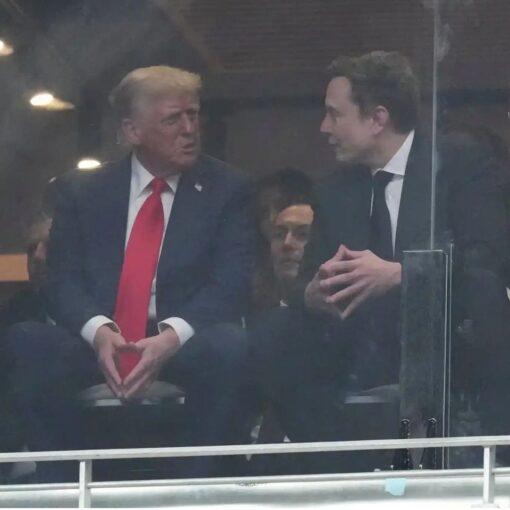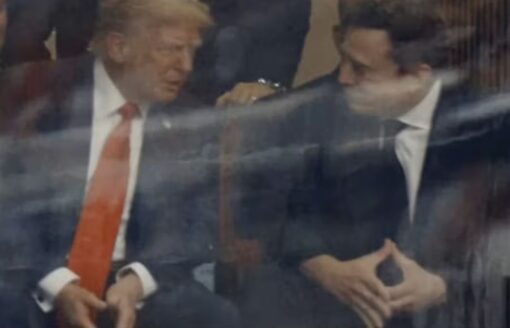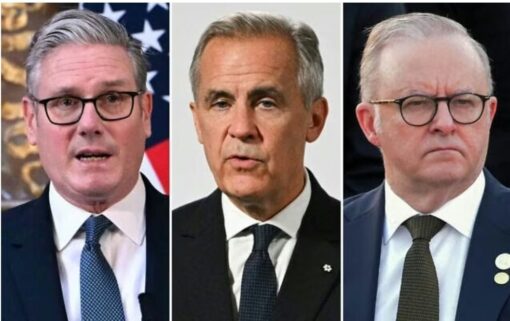U.S. President Donald Trump joined thousands of supporters in paying tribute at the memorial service for conservative activist Charlie Kirk, an event that unexpectedly drew the attention of political observers worldwide when Tesla and SpaceX CEO Elon Musk was spotted sitting alongside Trump, sharing what appeared to be an affectionate and animated conversation after months of strained relationship.
The unusual pairing of Trump and Musk at such a solemn occasion gave the memorial service a moment that quickly became the focus of national headlines, reflecting not only the size of the crowd but also the blending of political influence with Silicon Valley power.
Charlie Kirk, remembered by his allies as a “fighter for free speech and conservative values,” died earlier this month under circumstances that sparked tributes from across the right-wing political spectrum.
His memorial service, held in a packed auditorium in Arizona, gathered not only thousands of ordinary supporters but also high-profile politicians, media figures, and wealthy benefactors who had long championed his cause.
Attendees described the atmosphere as both mournful and celebratory, reflecting Kirk’s ability to galvanize a new generation of conservative voices.
But what set this event apart was the unexpected presence of Elon Musk, who has often described himself as a centrist but has in recent years become more vocal about free expression and government overreach.

Musk’s decision to attend the service and publicly align himself with Trump in front of such a large conservative audience underscored the blurring lines between politics, culture, and technology.
As one attendee put it, “Seeing Trump and Musk together felt like witnessing the merging of two different kinds of power—the political and the technological.”
Trump, dressed in a dark suit and red tie, arrived at the memorial to thunderous applause and chants of “USA” from the packed crowd.
In his tribute speech, he called Charlie Kirk a “patriot, a fighter, and a man who inspired millions with his courage.” He went on to say, “Charlie never backed down from the fight for America’s future. His voice will continue to live on in the movement he helped build.”
The speech was interrupted several times by standing ovations, reflecting the deep admiration Kirk commanded among his supporters.
Musk, who had taken his seat quietly before Trump’s arrival, became a focal point when cameras caught him leaning in to chat with the former president during pauses in the ceremony.
The two were seen smiling, gesturing with their hands, and at one point, Musk placed a reassuring hand on Trump’s arm. For many observers, this affectionate display hinted at a bond between the billionaire tech mogul and the Republican frontrunner for 2024 that could have far-reaching implications.
Political analysts quickly weighed in on the significance of the interaction. Some argued that Musk’s presence was symbolic of the growing alignment between parts of the tech world and the conservative movement, particularly around issues of free speech, censorship, and skepticism of government regulation.
Others, however, cautioned that Musk remains unpredictable and may simply have been paying his respects to a man he admired from a distance.
Still, the optics were powerful. Social media platforms buzzed with hashtags such as #TrumpMusk and #CharlieKirkMemorial, propelling the event into trending territory within hours.
Supporters praised Musk for showing solidarity with a conservative cause, while critics accused him of politicizing grief. In the words of one commentator, “the fact that people are debating Musk’s seat choice more than Kirk’s legacy says everything about the state of American politics today.”
The memorial itself featured a series of speeches from prominent conservative figures, including several U.S. senators, governors, and media personalities.
They praised Kirk’s tireless work in founding a youth movement that challenged what they called “the dominance of progressive ideology on campuses.”
Videos of Kirk’s past speeches were played on large screens, drawing emotional responses from the audience. His family members, visibly moved, thanked the thousands in attendance for honoring his legacy.
For Trump, the event was an opportunity to reaffirm his standing among conservative grassroots supporters while also signaling alliances that extend beyond traditional political circles.
His visible rapport with Musk suggested a willingness to embrace figures who wield influence outside Washington.
As one Republican strategist observed, “If Trump represents the political base and Musk represents the technological frontier, then their partnership—even if just symbolic—sends a message about the direction of conservative power in America.”
Musk, for his part, has increasingly positioned himself as a defender of open discourse, especially after his acquisition of X (formerly Twitter). By appearing at the memorial, he reinforced his alignment with a movement that has long accused mainstream platforms of silencing conservative voices.
“Charlie Kirk believed in free speech, and so do I,” Musk reportedly told a small group of attendees after the service, according to one eyewitness.
That statement, though brief, further fueled speculation about how Musk might play a role in shaping the political narrative ahead of the next presidential election.
Beyond politics, the memorial highlighted how figures like Kirk have managed to bridge activism, media, and grassroots mobilization.
His legacy, according to those who spoke at the service, was not just about policy but about cultivating a sense of identity and purpose among his supporters. “Charlie gave people a reason to believe in their country again,” one speaker said, drawing loud applause.
The blending of solemn remembrance with political spectacle underscored how much the American right has become a movement that thrives on moments of symbolism.

For many in attendance, seeing Trump and Musk together at the memorial felt like a passing of the torch from one generation of conservative leaders to another era where technology magnates play a central role.
As the crowd dispersed late into the evening, supporters lingered outside the venue, holding candles and waving American flags. Several said they were inspired not only by Kirk’s memory but also by the sight of Trump and Musk together. “It gave me hope for the future,” one attendee said. “It showed that the movement is bigger than one person.”
In the end, the Charlie Kirk memorial became more than a gathering of mourners—it became a stage for an unlikely convergence of political and technological power.
Trump’s fiery tribute and Musk’s quiet but highly symbolic presence offered a glimpse into the alliances and narratives that may shape America’s political landscape in the years to come.
And for those who admired Kirk, the event was a reminder that even in death, his influence continues to ripple across a movement that shows no signs of slowing down.


